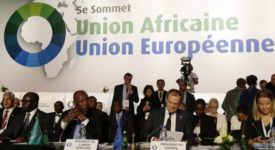The EU and ASEAN were both created during the Cold War. They had similar purposes. In a way, it was all about peace. It was about preventing recurring conflicts between member states in their respective regions while facing up external threats together: security from each other and security from the external world. Although much has changed in the international arena since the creation of the European Communities and ASEAN, much also remains the same. Both organizations still fulfill important security functions in their regions, and both still have an important stake in improving their collaboration to enable them to tackle better the challenges of the twenty-first century. Yet, the picture is not one of unalloyed success and the future of their relationship is fraught with perils as much as it offers potentialities for cooperation.
Cooperation between ASEAN and the European Union could help to address some of these challenges. When Belgian Vice-Prime Minister and Minister of Foreign Affairs Steven Vanackere gave the closing speech of the ASEM Public Conference on Europe-Asia Inter-Regional Relations in July 2010, he stated that “Europe is fascinated by Asia and vice-versa” – implying that the EU and ASEAN could learn from each other in obtaining sustainable economic development and other important areas.
While the EU seeks to learn from Asia to promote growth and to better deal with the world economic and financial crisis, Asia could learn from the EU in developing more participatory modes of governance. ASEAN could also usefully look into the EU experience of progressively integrating human rights into regional law and its potential for increasing democratic legitimacy. A frequent complaint on the ASEAN side is the lack of high-level political participation in EU interaction with ASEAN, although ‘at working level of officials the relationship is excellent.’ To maintain and develop a fruitful dialogue with ASEAN, the EU would do well to increase the level of its political representation to keep pace with American and Chinese increasingly high level interaction with ASEAN and participation in the EAS. The EU could also develop a more coherent political strategy towards ASEAN now that the Lisbon Treaty has entered into force and that the new External Action Service is in place.
Both the EU and ASEAN could also further develop professional, educational or business people-to-people links as well as the involvement of NGOs to improve dialogue and collaboration between the two regions. To this effect, direct contacts could be supplemented by ‘diaspora public diplomacy’, by making use of workers, migrants and refugees from Asia in the EU to increase knowledge about the EU in their countries of origin. The same could be done for EU expatriates living in ASEAN countries in promoting understanding of ASEAN and more dialogue between the EU and ASEAN. This would supplement on-going ventures such as the Asia-Europe Foundation (ASEF), which encourages links between governments and civil society in Asia as well as policy and academic cooperation and debates on themes of common concern, or the Trans-Eurasia Information Network (TEIN), which connects about 60 million researchers in Asia and Europe via ‘the first large-scale research and education internet-based network’. Another encouraging development is the inaugural Business Summit between the European Union and ASEAN which took place in May 2011 and led to discussions among business leaders and between business and governmental leaders from both regions. Such discussions could go a long way in improving trade and investment cooperation between ASEAN and the EU.
While some EU-funded projects in ASEAN have been largely successful, others were less so because of the lack of commitment on the part of ASEAN in contributing its own resources to the projects once EU funding was scaled down. This has led to unhappy episodes where the projects were discontinued or kept barely ‘alive’ by minimum financial contributions from the EU and ASEAN. An additional problem is the lack of administrative capacity on the part of some ASEAN countries in implementing region-to-region agreements. This is compounded by the fact that relations between the two regions ‘are largely driven by the foreign ministries in the ASEAN countries’ while initiation and implementation falls to a wide range of agencies in the ASEAN governments with lack of coordination between them. Clearly this situation needs to be improved as it is damaging to good relations between the two regions.
In many ways, ASEAN and the EU could ‘act together as natural soft power allies in addressing global challenges’ such as ‘migration, trafficking in human beings, money laundering, piracy, organized crime and drugs.’ They could further share information on how to deal with energy and environmental challenges. The EU has already given substantial support to the ASEAN Energy Centre and the ASEAN Centre for Biodiversity. In implementing its regional strategy for Asia, the European Commission has also pledged to prioritize projects that promote green growth and to establish ‘an Asia Investment Facility to facilitate investments relevant to climate change.’ The accession of ASEAN members to the Energy Charter Treaty could go a long way in facilitating regional energy cooperation in the region by providing a stable legal framework for energy trade and investment across borders that is able to ‘balance the interests of producer, consumer and transit countries’.
At the international level, an in-depth dialogue between ASEAN and the EU, including within ASEM, could lead to concrete actions in other frameworks such as the G20 and the WTO. Thus, ASEM meetings have led to concerted positions in preparation for G20 meetings. Such a dialogue has also been fruitful in efforts to reform the World Bank and the IMF to give more of a say to developing countries. Yet, cooperation between ASEAN and the EU can only work fully if it is rooted in mutual respect and understanding. Only on such basis can an effective strategic partnership be built.







